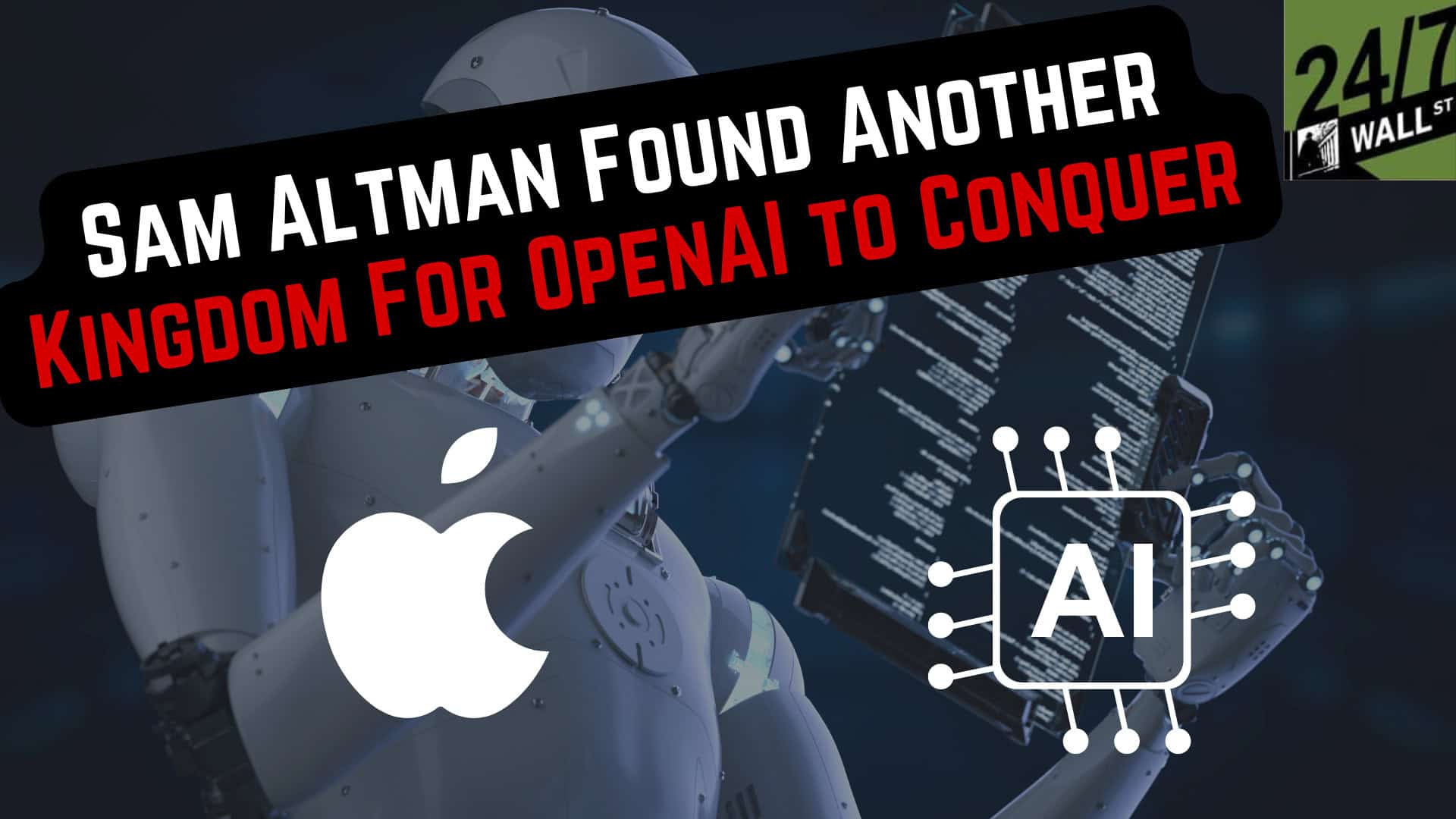Investing
Sam Altman Found Another Kingdom For OpenAI to Conquer

Published:
Last Updated:

Lee and Doug discuss the partnership between John Ive, the iconic designer behind many Apple (NASDAQ: AAPL) products, and OpenAI, led by Sam Altman, to develop an AI-based hardware product. They speculate on the potential of this product, considering it could range from a phone to a standalone device, and the implications this could have for the market. They also draw parallels with how companies like Microsoft (NASDAQ: MSFT) and Google (NASDAQ: GOOG) successfully transitioned from software to hardware, suggesting that this could be a similar playbook. The conversation touches on the broader implications for industries such as automobiles and space travel, speculating that figures like Elon Musk might also be involved.
[00:00:00] Douglas A. McIntyre: Uh, John Ive, who most people don’t know, but was Steve Jobs partner, basically, at iPhone. He was in charge of designing all the iconic designs that you see today of all those products were done by him. Has apparently started a partnership with, uh, OpenAI and, you know, the people there working on an AI based hardware product.
[00:00:29] Douglas A. McIntyre: You know, that’s in the newspapers. You can’t, I’m not sure what it means. Once you start to talk about AI based hardware, now you’re talking about, uh, you know, Apple at the top of that list. Also, if you walk into a consumer electronics store, there are a whole bunch of things that if you had AI driven hardware, you could, you could disintermediate a whole bunch of products.
[00:01:00] Lee Jackson: Yeah, and I think it’s interesting that that Sam Altman, you know, is is working with I’ve to create this AI hardware product. What will it be? You know, will it be some sort of phone? Will it be like a laptop or something like that? Or will it be a standalone item that you, you know, plug into? I think it’s really interesting.
[00:01:23] Lee Jackson: And it’s going to show you The move that the A. I. Market’s going to take because the chips will continue to get bigger and better and have more capacity, you know, as we’ve discussed, you know, in the past with where at certain levels of of productivity, the A. I. Chip from A. M. D. Is actually better than in videos, but not at lower levels.
[00:01:44] Lee Jackson: Then I think it’s going to be interesting to see because You know, Altman Altman’s right there. He’s right there with what’s going on. And I wouldn’t be surprised if somewhere Musk is in the mix here because of his involvement with, with Chad GPT and all, uh, and all that in the past.
[00:02:02] Douglas A. McIntyre: It reminds me in many ways of, uh, Microsoft and Google, Microsoft software company.
[00:02:07] Douglas A. McIntyre: I know they had a gaming division, but Microsoft decided to get into the hardware business. They tried to get into the. You know, hardware business with smartphones, like before most people were born, but the surface, uh, the surface PCs that Microsoft sells right now do extremely well. It’s, it’s not an unimportant part of, uh, of Microsoft sales.
[00:02:32] Lee Jackson: No, it’s good.
[00:02:34] Douglas A. McIntyre: And then Google. Now they’re selling pixel phones. So this playbook, I want to call it a playbook of being in the software industry and deciding to in essence get into the hardware industry, because you see there’s, you know, there’s another kingdom over there for you to conquer. This is not a new playbook.
[00:02:56] Douglas A. McIntyre: Well, and you’ve got to
[00:02:57] Lee Jackson: think that, that, you know, such an incredible innovator like Ivan and Altman, you have to think that they’re talking with somebody else, you know, to do this product for, or with, I mean, Who is it? Is it Musk? Is it Tesla? Is it you know, something will be developed for automobiles? It’s going to be developed for, you know, space travel, you know, what will it be for?
[00:03:19] Lee Jackson: But you’re 100 percent correct there because Google has been able to stay in the You You know, they’ve been able to stay in the market with the pixel. It doesn’t do huge, but it, you know, it probably pays for itself. And like you said, the, the surface hat, they have this ancillary sort of deal with the NFL, you know, cause that’s what they’re always using on the sidelines if they have to.
[00:03:42] Lee Jackson: Yeah. Even if they want to
[00:03:43] Douglas A. McIntyre: throw them on the ground and break them.
[00:03:44] Lee Jackson: Yeah. Yeah. Like Tom Brady did. But so, yeah, I mean, that kind of. tacit sort of constant endorsement. I’m sure people have gone out and said, uh, I don’t like my iPad that much. Let me try a surface though. All the football players seem to like it.
[00:04:00] Douglas A. McIntyre: Yeah.
Retirement can be daunting, but it doesn’t need to be.
Imagine having an expert in your corner to help you with your financial goals. Someone to help you determine if you’re ahead, behind, or right on track. With SmartAsset, that’s not just a dream—it’s reality. This free tool connects you with pre-screened financial advisors who work in your best interests. It’s quick, it’s easy, so take the leap today and start planning smarter!
Don’t waste another minute; get started right here and help your retirement dreams become a retirement reality.
Thank you for reading! Have some feedback for us?
Contact the 24/7 Wall St. editorial team.